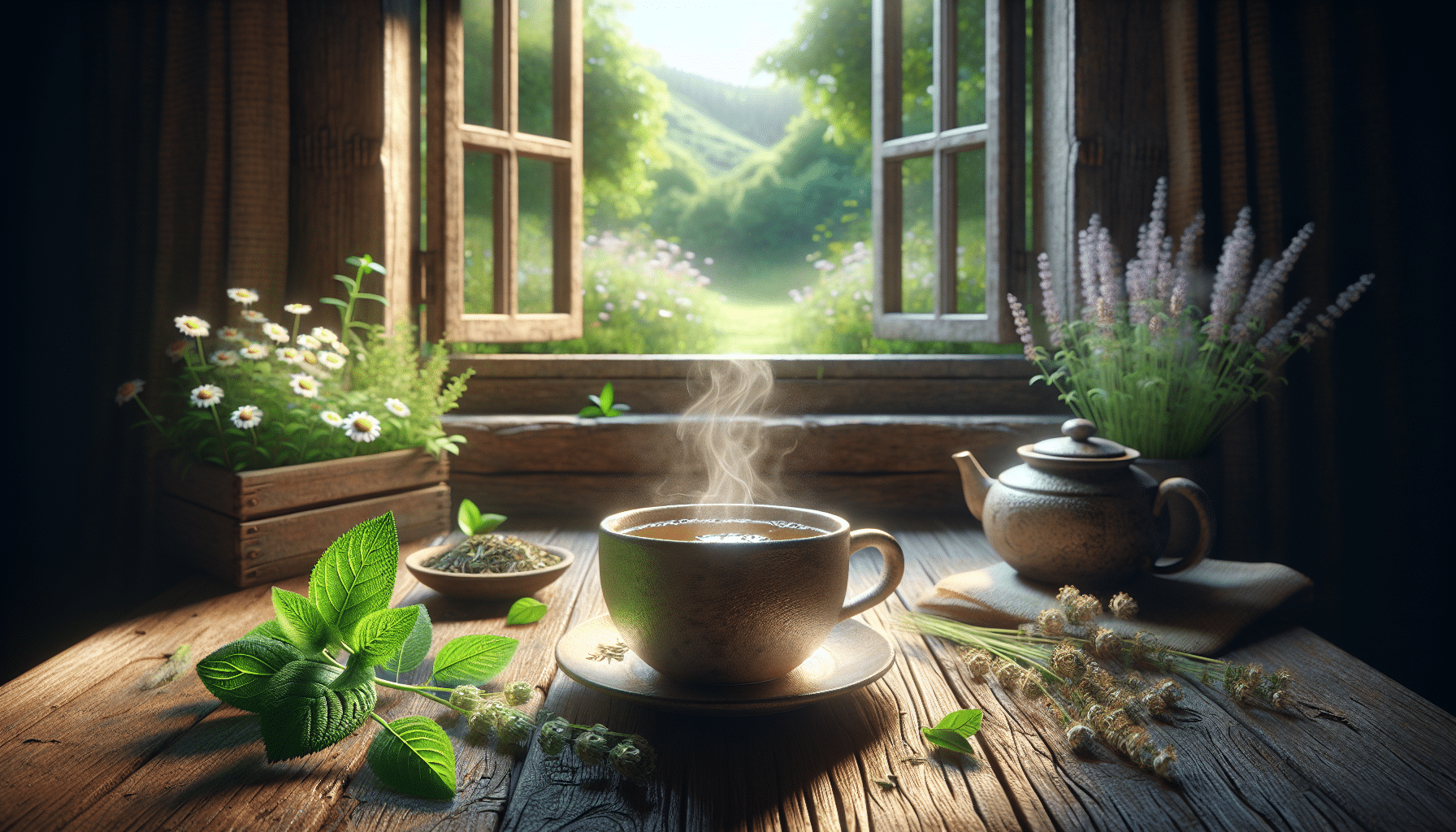Advertisements
Anxiety is a phenomenon that affects millions of people around the world, manifesting in ways as diverse as insomnia, palpitations, irritability, and difficulty concentrating. Natural teas to calm anxiety: a complete guide.
In a world where a frenetic pace has become the norm, finding effective and natural ways to calm the mind has never been more crucial. This is where natural chai comes into play, offering an oasis of tranquility amidst the daily chaos.
Advertisements
Since time immemorial, cultures around the world have turned to herbal teas not only for their physical health benefits but also for their ability to calm the mind and nourish the spirit. But what makes these teas so effective for treating anxiety?
As we delve into the world of natural chás, we find an astonishing variety of plants, each with its own unique properties.
Advertisements
For example, chamomile, known for its delicate white flowers, has been prized for centuries for its ability to induce sleep and reduce stress.
Lavender tea, with its fragrant aroma, is used to relieve tension and improve mood. We can't forget valerian tea, famous for its powerful calming effect that can rival even some conventional medications.
See also:
- Immerse yourself in audiobooks with these apps.
- Early warning: detect earthquakes now!
- Become a Pokémon Master
- Breathe: disconnect and come back to yourself
- Instant Calm: Innovative Anti-Anxiety Apps
By understanding these plants and their benefits, we can begin to integrate these ancient remedies into our daily lives, creating tranquilizing rituals that help us cope with modern pressures.
In this article, we'll explore the calming benefits of natural teas in depth, focusing on their active ingredients and how they interact with our nervous system to alleviate the symptoms of anxiety.
We'll also discuss how to properly prepare these infusions to maximize their effects and offer practical tips for incorporating the tea ritual into your daily routine. We'll also examine recent scientific studies that support the use of these natural remedies, providing a solid foundation for their effectiveness.
Prepare to discover a world of flavors, aromas, and serenity, and let these infusions be your allies in your quest for a calmer mind and a more balanced spirit. 🍵✨
The Science Behind Natural Chás
Natural teas have been used for centuries as effective remedies for a variety of conditions, including anxiety. Modern science has begun to reveal the mechanisms behind their effectiveness. Many of these teas contain compounds that interact with the nervous system to induce a feeling of calm and relaxation.
Anxiety, which affects millions of people worldwide, can be debilitating, and finding natural methods to manage it is a priority for many.
Recent studies have highlighted that certain plants possess anxiolytic properties, meaning they can help reduce anxiety. The power of chás lies in their active ingredients, such as flavonoids and essential oils, which have a direct impact on the brain.
For example, chamomile is known for its apigenin content, a flavonoid that binds to GABA receptors in the brain, promoting relaxation.
Key Components in Chás for Anxiety
The effectiveness of a specific tea in relieving anxiety can be attributed to several natural compounds present in the herbs used. Here, we analyze some of the most important:
- Flavonoids: Powerful antioxidants that can help improve cerebral blood flow and reduce inflammation, contributing to mood stability.
- Essential oils: Found in herbs such as mint and lemon, they can have calming effects when inhaled or consumed.
- Alkaloids: Compounds that can have a positive effect on mood and energy levels.
With this information in mind, it's helpful to explore how each type of tea can affect the body and mind, helping to mitigate anxiety naturally and effectively.
Types of Natural Tea to Combat Anxiety
There are several types of teas that have been shown to be helpful in calming the mind and relieving anxiety. Each has unique properties that make it suitable for different personal needs and preferences. Here are some of the most popular and effective.
Chamomile Tea
Chamomile is perhaps one of the best-known herbal remedies for anxiety. Known for its calming properties, chamomile tea has been used for centuries to promote relaxation and improve sleep.
Its mild sedative effects are largely due to apigenin, an antioxidant that binds to receptors in the brain, thereby reducing excessive neuronal activity.
A study published in the Journal of Clinical Psychopharmacology found that people taking chamomile extract experienced a significant reduction in anxiety symptoms compared to the placebo group.
Chamomile not only helps reduce anxiety, but can also improve sleep quality, which is crucial for those suffering from anxiety disorders.
Valerian Tea
Valerian is another popular herb used to treat anxiety. Known for its ability to improve sleep quality and reduce nervousness, valerian tea is an effective option for those seeking a natural approach to anxiety management.
Valerian root contains valerenic acid, which has been shown to have an effect on GABA receptors in the brain, thereby increasing relaxation levels.
Additionally, valerian may be helpful for people experiencing insomnia due to anxiety. A study published in Phytotherapy Research revealed that valerian can help improve sleep quality without causing significant side effects, making it a safe option for long-term treatment.
Lavender Tea
Lavender tea is known for its calming aroma and relaxing effects. Lavender contains compounds that can help reduce anxiety and improve mood.
Linalool, a compound found in lavender, has been the subject of studies demonstrating its ability to reduce anxiety and promote calm.
A study conducted in Japan found that the scent of lavender had an anxiolytic effect on people, reducing their anxiety and improving their mood.
Although the study focused on aromatherapy, consuming lavender tea may provide similar benefits due to the presence of the same active compounds.
For those who want to explore more about using lavender for anxiety, I recommend watching the video “Lavender Tea Benefits and Uses” on the Natural Health Remedies channel.
Preparation Techniques to Maximize Benefits
The tea preparation method can significantly influence its health benefits. Below, we explore some techniques and tips for preparing natural teas that maximize their soothing properties.
Selection of Ingredients
The quality of the ingredients is essential to ensure that natural teas are effective in treating anxiety.
Always choose fresh, high-quality herbs, preferably organic, to avoid pesticides and other contaminants. Buying from trusted stores or directly from local producers can ensure you're getting the best ingredients.
Choosing fresh ingredients not only enhances the flavor of the tea, but also ensures that you get the full therapeutic benefits of the herbs.
For example, fresh mint tends to have a more robust flavor and more pronounced benefits compared to its dried version.
Infusion Method
The infusion method is crucial for efficiently extracting the herbs' active compounds. Generally, it's recommended to use hot, but not boiling, water, as excessive heat can degrade some beneficial compounds. The ideal temperature is usually around 90–95°C.
Steeping time also plays an important role. For most chás, a 5- to 10-minute steeping time is recommended. However, some denser ingredients, such as valerian root, may require a longer steeping time to fully unleash their benefits.
Personalization and Combination
Customizing and combining different herbs can be an effective way to maximize the benefits of natural teas. Experimenting with herbal blends can result in a tea that's not only palatable but also more effective at relieving anxiety.
For example, combining chamomile with mint can provide a relaxing and refreshing experience, while blending lavender with lemon can offer a calming and revitalizing infusion. Don't be afraid to experiment until you find the perfect combination that suits your needs and preferences.
HerbPrimary BenefitInfusion TimeChamomileRelaxation5-7 minutesValerianSleep Improvement10-15 minutesLavenderAnxiety Reduction5-10 minutes
If you're interested in learning more about these techniques, I encourage you to watch the video "How to Brew Herbal Tea: Tips & Tricks" on the Tea Time with Rach channel.
Benefits
In conclusion, the article “Discover the Power of Natural Teas to Calm the Mind: A Natural Solution for Anxiety” has allowed us to explore a holistic and accessible approach to addressing one of the most common concerns of modern life: anxiety.
Throughout our discussion, we examined various types of natural teas, their calming properties, and how they can be effectively integrated into our daily routines to foster a sense of peace and mental well-being. 😊
We begin by exploring the rich tradition of natural teas, which have been valued throughout history for their many health benefits.
Specifically, we focus on those known for their anti-anxiety properties, such as chamomile, lavender, valerian, and lemon balm.
Each of these teas offers a unique combination of bioactive compounds that interact with the body to reduce stress levels and promote relaxation.
Chamomile, for example, contains apigenin, an antioxidant that binds to certain receptors in the brain to reduce anxiety and promote restful sleep.
Additionally, we discussed how incorporating these teas into our daily routine not only offers physical benefits but also creates a self-care ritual that can have profound psychological effects.
Conclusion 1
Taking a few minutes to prepare and enjoy a cup of tea can serve as a meditative pause during a hectic day, helping us reconnect with the present and find mental balance.
It's important to remember that while natural teas can be an effective tool for managing anxiety, they are not a substitute for professional medical advice.
People who experience severe or persistent anxiety symptoms should seek guidance from a healthcare professional to develop a comprehensive treatment plan, which may include both medical interventions and complementary practices, such as the use of chás.
The value of natural teas lies in their accessibility and versatility. They are an affordable and easy-to-implement option that can complement other wellness practices, such as meditation, exercise, and a balanced diet.
Furthermore, the world of chás is so vast and diverse that there is always room for exploration and the discovery of new varieties and combinations that suit our personal tastes and needs.
Conclusion 1
Ultimately, by embracing the use of natural teas as part of a broader approach to mental well-being, we benefit not only individually.
But we also contribute to a culture that values and promotes natural and sustainable alternatives for health care.
We invite you to share your experiences with chás and discuss the benefits you've found. Let's explore together new ways to integrate these natural wonders into our daily lives.
By the end of this article, we hope we've inspired you to consider natural teas as a valuable tool for your well-being. Feel free to share this knowledge with friends and family, and don't hesitate to explore this fascinating topic further. 🌸
For those interested in further research on the power of natural chás, we recommend visiting PubMed to access scientific studies and NCCIH.
Thank you for joining us on this journey toward a more peaceful and balanced life!







